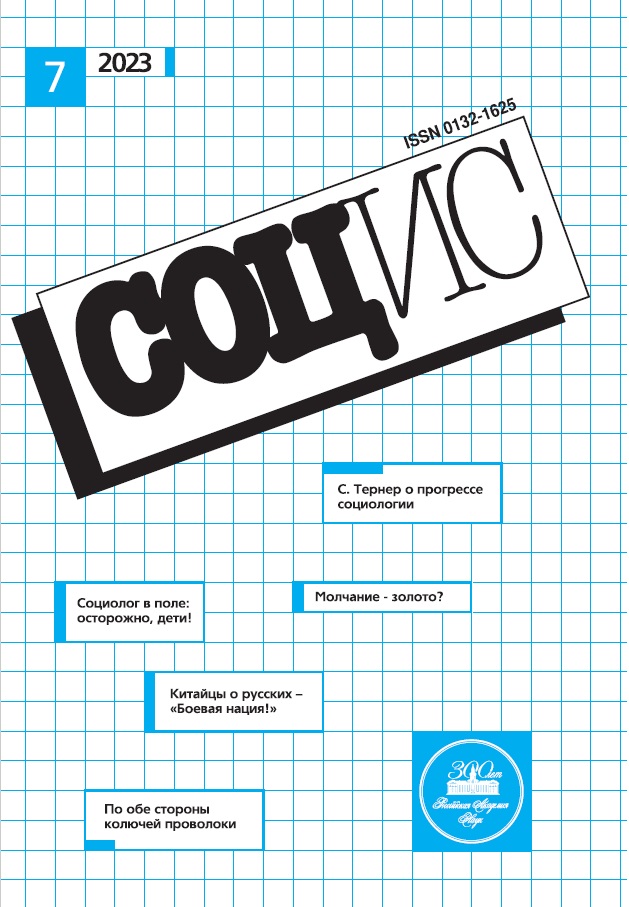The Social Role Mastering of the Patient during Childhood
- 作者: Beschetnova O.V.1, Mayorova-Shcheglova S.N.2
-
隶属关系:
- Russian Biotechnological University (ROSBIOTECH)
- Moscow State Psychological and Pedagogical University
- 期: 编号 7 (2023)
- 页面: 75-83
- 栏目: Articles
- URL: https://cijournal.ru/0132-1625/article/view/661743
- DOI: https://doi.org/10.31857/S013216250026585-6
- ID: 661743
如何引用文章
详细
The article analyzes the body of social sciences and humanities knowledge about the process and results of mastering patient’s role in childhood. A definition is offered of a minor patient role as a transitive state of behavior for the development of medical-preventive and medical-therapeutic actions aimed at sustaining one's health. The problems of normative institutionalization and habituation, as well as objectification of such practices for the child are discussed. Basing on a study of modern childhood events impact on the development of independence and growing up, conclusions were made about the importance of role-playing training by way of practicing routine everyday activities: performing medical manipulations on one’s own body at home in case of illness and visiting a doctor. A correlation was found between the age of mastering the elements of this role in the process of socialization and the gender of the respondents, the type/composition of the parental family, its wealth, place of residence and medical infrastructure. In conclusion, the necessity is substantiated to study childhood socialization process for the formation of healthy adult members of society leading a correct lifestyle, and self-preserving behavior of people with disabilities.
作者简介
Oksana Beschetnova
Russian Biotechnological University (ROSBIOTECH)Russian Federation, Moscow
Svetlana Mayorova-Shcheglova
Moscow State Psychological and Pedagogical UniversityRussian Federation, Moscow
参考
- Агаларова К.Н. Восприятие подростками больничной среды // Клиническая и специальная психология. 2016. Т. 5. № 1. С. 33–44. doi: 10.17759/cpse.2016050103.
- Бессчетнова О.В. Благополучие детей как социальная проблема // Logos et Praxis. 2019. Т. 18. № 4. С. 42–52.
- Бовина И.Б., Дворянчиков Н.В., Дани Л. и др. Здоровье в представлениях детей и подростков // Экспериментальная психология. 2018. Т. 11. № 1. С. 61–74. doi: 10.17759/exppsy.2018110104.
- Бондаренко С.М., Смирнов В.В., Даниленко О.В., Петряйкина Е.Е. Особенности внутренней картины болезни у детей и подростков, больных сахарным диабетом I типа // Педиатрия. Журнал им. Г.Н. Сперанского. 2006. Т. 85. № 4. С. 22–26.
- Гордиец А.В., Груздева О.В. Особенности психологического развития часто болеющих детей // Российский педиатрический журнал. 2013. № 4. С. 24–27.
- Грошев И.В. Особенности восприятия, осознания и формирования внутренней картины болезни у девочек и мальчиков // Социология медицины. 2016. Т. 15. № 2. С. 91–97.
- Довгая Н.А., Малых А.Е. Медицинские страхи у детей // Вопросы психического здоровья детей и подростков. 2022. Т. 22. № 1. С. 34–40.
- Зинченко Т.О. Особенности отношения к здоровью у подростков в зависимости от пола // Известия Воронежского государственного педагогического университета. Педагогические науки. 2014. № 1(262). С. 140–142.
- Казанская К.О., Мещеряков Б.Г. Концептуальные изменения в представлениях о здоровье и болезни у младших школьников // Культурно-историческая психология. 2012. Т. 8. № 3. С. 19–29.
- Кононова А.Е. Социально-экономические факторы детского здоровья в России // Социологические исследования. 2016. № 4. С. 94–102.
- Майорова-Щеглова С.Н., Колосова Е.А., Губанова А.Ю. Событийность детства: к вопросу об эмпирических доказательствах новой теории генераций // Социологические исследования. 2020. № 3. С. 3–15. doi: 10.31857/S013216250008796-8.
- Митрофанова С.Ю. (Не)законченное детство современных юношей и девушек // Вестник Восточной экономико-юридической гуманитарной академии. 2019. № 2 (100). С. 89–96.
- Пузанова Ж.В., Ларина Т.И., Тертышникова А.Г. Инфантилизация молодежи: методологический подход к измерению // Вестник РУДН. Сер.: Социология. 2021. Т. 21. № 3. C. 444–456. doi: 10.22363/2313-2272-2021-21-3-444-456.
- Свистунова Е.В. Как ребенок воспринимает болезнь // Медицинская сестра. 2012. № 2. С. 47–52.
- Хамитова Г.М. Гражданско-правовое положение несовершеннолетних пациентов в Российской Федерации: автореферат дис. ... канд. юрид. н. Казань, 2018.
- Шишкова И.М. Влияние семейных факторов на формирование внутренней картины здоровья ребенка // Личность в меняющемся мире: здоровье, адаптация, развитие. 2018. Т. 6. № 3 (22). С. 563–574.
- Ядова М.А. Жизненные траектории молодежи в XXI веке: риски и возможности // Социологические исследования. 2022. № 2. С. 83–93. doi: 10.31857/S013216250011067-6.
- Larsson I., Staland‐Nyman C., Svedberg P. et al. Children and young people's participation in developing interventions in health and well‐being: a scoping review // BMC Health Serv Res. 2018. No. 18(1). P. 507–527.
- Sommer D., Pramling S.I., Hundeide K. Child Perspectives and Children’s Perspectives in Theory and Practice. New York: Springer, 2010.
补充文件









